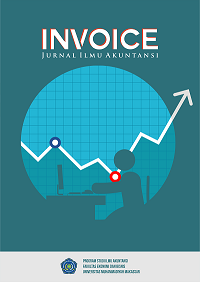EFEKTIVITAS PENGGUNAAN E-FILING DALAM RANGKA MENINGKATKAN KEPATUHAN PELAPORAN SURAT PEMBERITAHUAN TAHUNAN WAJIB PAJAK ORANG PRIBADI
DOI:
https://doi.org/10.26618/inv.v2i1.3181Abstract
In an effort to maximize Taxpayer Compliance, the Directorate General of Taxation always optimizes services so as to increase public awareness of orderliness as taxpayers, one way to do tax reform is to utilize information and communication technology by implementing e-filing systems. This research is a Mix Method research in which research combines two research methods at the same time, qualitative and quantitative. The purpose of this study is to determine the Effectiveness of the Use of E-Filing in the Framework of Improving Compliance Reporting the Obligatory Annual Notification of Individuals. The results of this study indicate that the use of e-filing has been successful in increasing the compliance of individual taxpayers by increasing the annual tax return report of individual taxpayers. Taxpayers find it easy to report their annual tax returns by using e-filing. In addition, taxpayers are aware of their obligations as taxpayers. However, there are some obstacles in implementing e-filing, namely the lack of knowledge of taxpayers and the difficulty of convincing taxpayers to use e-filing effectively and efficiently.
References
Daftar Pustaka
Abdurrohman, S. 2015. Implementasi Program E-Filing Dalam Upaya Peningkatan Kepatuhan Wajib Pajak Orang Pribadi (Studi pada Kantor Pelayanan Pajak Pratama Bojonegoro). Jurnal Administrasi Publik, 3(5),807-811.
Akib, M., & Amdayani, L. 2017. Analisis Penerapan Sistem E-Filing Dalam
Menyampaikan Surat Pemberitahuan (SPT) Wajib Pajak Orang Pribadi (Studi pada KPP Pratama Kendari). Jurnal Akuntansi dan Keuangan, 1(1).
Avianto, G. D., Rahayu, S. M., & Kaniskha, B. 2016. Analisa Peranan E-Filing Dalam Rangka Meningkatkan Kepatuhan Pelaporan Surat Pemberitahuan Tahunan Wajib Pajak Orang Pribadi (Studi pada Kantor Pelayanan Pajak Pratama Malang Selatan). Jurnal Mahasiswa Perpajakan, 9(1).
Bayangkara, IBK. 2017. Audit manajemen Prosedur dan Implementasi. Jakarta: Salemba Empat.
Dyanrosi, A. 2015. Analisis Perilaku Wajib Pajak Orang Pribadi Terhadap Minat Perilaku Menggunakan E-Filing. JISIP: Jurnal Sosial dan Ilmu Politik,4(2). Http://www.maxmanroe.com/vid/umum/penelitian-kualitatif.html Http://www.pajak.go.id/artikel/inklusif-inovatif-wujudkan-kp2kp-yang-transformatif
Kurniati, D. H., Susilo, H., and Mukzam, M.D. 2016. Pengaruh Pengetahuan Perpajakan dan kualitas Pelayanan terhadap Kesadaran Wajib Pajak dalam Menyampaikan Surat Pemberitahuan(spt) Tahunan (Studi pada Kpp Pratama Blitar). Jurnal Mahasiswa Perpajakan, 9(1).
Marliana, R., Suherman, M., & Almunawwaroh, M. 2017. Pengaruh Penerapan E-Filing Terhadap Kepatuhan Wajib Pajak dalam penyampaian Surat Pemberitahuan (SPT) Tahunan pada Kantor Pelayanan Pajak Pratama Kota Tasikmalaya. Media Riset Akuntansi, Auditing & Informasi, 15(1), 49-64.
Novarina, A. l. 2005. Implementasi Electronic Filing System (E-Filing) Dalam Praktik Penyampaian Surat Pemberitahuan (SPT) Di Indonesia (Doctoral Dissertation, Program Pasca Sarjana Universitas Diponegoro.
Nurlaela, L. 2018. Pengaruh Penerapan E-Filing Terhadap Kepatuhan Wajib Pajak pada KPP Pratama Garut. Journal Wahana Akuntansi, 2(2)
Oktariyanti, G. K. (2018). Penggunan System Aplikasi E-Filing Dalam Pelayanan Perpajakan Terhadap Kepatuhan Wajib Pajak Pada Kantor Pelayanan Pajak Pratama Baturaja Dalam Perspektif Hukum Ekonomi Syari’ah (Doctoral dissertation, fakultas syariah dan hukum).
Purwono, Herry. 2010. Dasar-Dasar Perpajakan & Akuntansi Pajak. Jakarta: PT Gelora Aksara Pratama.
Resmi, Siti. 2013. Perpajakan teori dan kasus. Edisi 6, Jakarta: Salemba Empat.
Sari, N. A., Bandang, A., & Rura, Y. (2013). Analisis Kepatuhan Wajib Pajak atas Penyampaian SPT masa PPN dengan Penerapan Elektronik (e-SPT) di kantor Pelayanan Pajak Makassar Utara. Skripsi. Fakultas Ekonomi dan Bisnis Universitas Hasanuddin Mkassar.
Soekirman, A., Rachmany, H., & Happy, V. V. (2018). Analisis Implementasi Kebijakan Sistem Electronic Filing sebagai upaya menngkatkan Kepatuhan Wajib Pajak dalam Penyampaian Surat Pemberitahuan Tahunan kepada KPP Pratama Tangerang Barat Tahun 2013,2014, dan 2015. Jurnal ilmiah untuk Mewujudkan Masyarakat Madani, 5(2), 174-184.
Supadmi, N. L. 2009. Meningkatkan Kepatuhan Wajib Pajak Melalui Kualitas Pelayanan. Jurnal Ilmiah Akuntansi Dan Bisnis.
Downloads
Published
Issue
Section
License
Authors who publish with Invoice: Jurnal Ilmu Akuntansi agree to the following terms:
Copyright Ownership
The copyright of all articles published in this journal remains with the author(s). However, the authors grant Invoice: Jurnal Ilmu Akuntansi the right of first publication with the work simultaneously licensed under a Creative Commons Attribution 4.0 International License (CC BY 4.0). This license allows others to share, copy, redistribute, adapt, and build upon the work for any purpose, even commercially, as long as proper credit is given to the original author(s) and the source.Licensing and Access
Invoice: Jurnal Ilmu Akuntansi provides immediate open access to its content on the principle that making research freely available to the public supports a greater global exchange of knowledge. All published materials are available freely without subscription or payment and can be accessed, downloaded, and reused by any user provided that appropriate attribution is given.Permission for Reuse
For uses not covered by the CC BY 4.0 license, such as commercial reprints, translations, or any form of adaptation without clear attribution, users must obtain written permission from the editorial team. Requests for such permissions can be directed to the editorial office at: [insert journal email here].Plagiarism and Originality
Authors are responsible for the originality of their submissions. All articles are screened for plagiarism using appropriate tools before acceptance. Manuscripts found to contain unoriginal content or infringing materials will be rejected or retracted as per journal policy.

